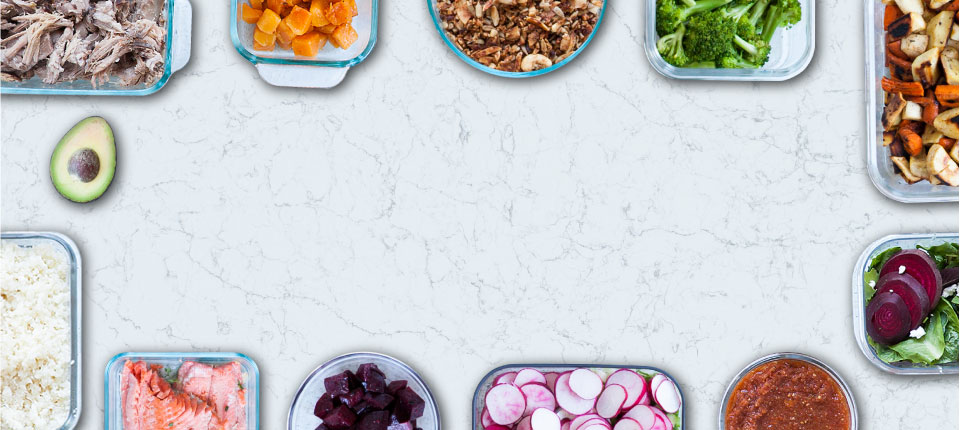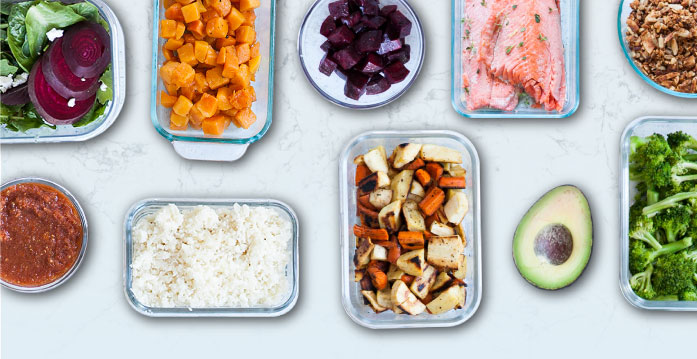1. What is a low carb diet?
The Ketogenic diet is a very low-carb, high-fat diet. Carbs are replaced with healthy fats and the reduction of carbs triggers a metabolic state known as lipolysis. Lipolysis is a process that occurs when the body begins to use fat for energy, instead of carbohydrates obtained from food. The by-products of lipolysis are ketones and ketosis is the secondary process of lipolysis.
By depriving the body of carbohydrates, which is converted to glucose and typically used as fuel, it is forced to use its fat stores instead, literally melting it off the body when it is in ketosis.
Ketosis makes the body burn stored and dietary fat for energy instead of getting its energy from the carbs you eat. Ketosis also turns fat into ketones in the liver that helps supply energy to the brain.
2. What can I eat on a low carb diet?
There are plenty of great choices, recipes, and combinations of low carb meals and foods.
- Turkey, chicken, red meat, ham, sausage, bacon, organ meat and exotic fowl
- Fish and seafood
- Eggs
- All non-starchy vegetables, including, leafy greens, onions, tomatoes, peppers,
- Mushrooms, olives, etc.
- Butter, heavy cream, full fat sour cream and salad dressings (check labels for carb count)
- Whole full fat unprocessed cheeses, including, cheddar gouda, mozzarella, parmesan and
- Blue cheese in moderation
- Almonds, walnuts, peanuts, nut butters, sunflower seeds, flaxseeds, pumpkin seeds, and
- Chia seeds in moderation
- Extra virgin olive oil, coconut oil and avocado oil
- Avocados (whole or guacamole made from fresh whole avocados)
- Salt, herbs and spices
- No carb sauces like some hot sauce brands, and soy sauce, check labels.
- Berries in moderation
- Drinks: water, unsweetened tea, unsweetened coffee, club soda, no-calorie flavored seltzers, herbal tea
3. What carbs are not allowed?
In low carb diets, the majority of carb intake should be limited to non-starchy vegetables, and small amounts of cheese and full fat dairy, like sour cream and heavy whipping cream.
No refined sugar, sweets, fruit, rice, pasta, bread, grains, starches, starchy vegetables, flour, and products made with it, or beans are allowed, especially initially in order to trigger ketosis.
Slow integration of some carb rich foods, like nuts, berries, and even beans can take place as you progress through the diet and reach your goals and how much and what carbs you can have depends on your individual weight loss progress and how those carbs effect it. Refined sugar is never allowed.
4. How many carbs can I eat?
This really depends on the particular plan and your goals. The strictest recommendation is 20 grams or less, as is the case with the Ketogenic diet. Overall, 50 grams or less daily is recommended.
Additionally, physical activity matters, meaning the more active you are, the more carbs you can eat, but keep in mind the carb sources should still be vegetables, nuts, berries and possibly beans in moderation. If you are thrown out of ketosis or weight loss stalls, then carb intake will have to be altered.
5. Do I have to count calories?
Low carb diets advocate eating to satisfaction and there is no need to count calories. When you eliminate unhealthy carbs from your diet, you also get rid of out of control cravings, stabilize blood sugar and consequently the appetite. Research has shown that reducing carbohydrates and replacing them with protein and healthy fats results in reducing overall calorie consumption naturally and without starvation.
Many people report having to remember to eat by a clock because they simply do not feel out of control hunger as they did before cutting out carbs.
6. How can it be healthy to cut out carbs from my diet? I want to lose some weight but cutting out something as important to our bodies as carbs scares me.
This is really up to you and every person’s body is different. However, it is important to remember that a low carb diet allows non-starchy vegetables, which are the healthiest carbs. It is the unhealthy carbs that are cut out, like refined sugar and sweets that do nothing but harm the body along with grains, like rice and pasta, which many experts believe we can live without.
This includes whole grains, which are not much different from sugar in their ability to release glucose and often have a higher glycemic index than sugary foods, which means they cause more of an insulin response in the body.
Another important factor is that you eliminate carbs, but increase intake of healthy fats. Fats tend to get a bad rap in the food chain when in fact some of them are actually very good for you. There are many essential nutrients we get from fatty foods such as avocado, meats, butter, cheese, coconut, and olive oils, not the least of which is energy and subsequent result of fat burning ketosis.
7. Are there any side effects to cutting out carbs?
Some people experience digestion problems, but this common side effect typically goes away after about four weeks. Eating more high-fiber vegetables, like leafy greens and broccoli helps and magnesium supplements can alleviate constipation. It’s also common to get the ‘keto flu’ the first few days of low carb as your body adjusts to eating differently.
8. I had a friend tell me they got dizzy, and had headaches with their low carb eating diet. Is this possible?
This can be a common occurrence and is caused by the kidneys excreting salt more rapidly as a result of ketosis, a process instigated by low carb eating where the body begins to use fat for energy instead of consumed carbs.
Since the body is getting rid of excess water and salt, it simply means you need to get more salt and drink more water. To counteract this, drink 1 or 2 cups of clear broth every day to add about 1 or 2 grams of salt to your daily intake. Whole meats and green leafy vegetables are both also great sources of potassium.
9. I know I will miss carbs, and my old sugary favorites, what can I do?
At the beginning, you will definitely miss some of your old favorites. Any time you change your eating style, that is going to be true. However, once you kick the sugar habit, your body and mind will adjust and you will be better for it.
Plus, you’ll quickly find there are many desserts and snacks that are low carb with some easy changes. It’s all about moderation and learning to make different choices along the way.


